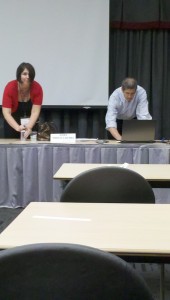 Yes. I know how to use social media. But I want to be in the middle of a group of HR professionals who battle in the trenches every day and hear what they want to know about the social stuff. While I love doing what I do, I understand that there\’s a whole other world out there of people who could really use this stuff (if only they knew how or what to ask). That\’s why Project:Social was started.
Yes. I know how to use social media. But I want to be in the middle of a group of HR professionals who battle in the trenches every day and hear what they want to know about the social stuff. While I love doing what I do, I understand that there\’s a whole other world out there of people who could really use this stuff (if only they knew how or what to ask). That\’s why Project:Social was started.
By the way, I\’m coming to you from the Human Resources Management Conference in Tuscaloosa, Alabama. Check back for more coverage of the event!
The fun for me actually started before the actual session. I had the opportunity to share my lunch hour with Dawn and we talked on HRevolution, deep career issues, and blogging. Plus I got to show off pictures of my girls. Always fun. :-)
Killer Quotes
“[Why did I start using this stuff?] I just wanted to start learning about social media for recruiting.†Dawn Hrdlica-Burke
I\’ve received more than I\’ve given with social media/blogging. That\’s why I do what I do. -Kris Dunn
Your handbook is already there to help remove people who have a major error in judgment. Don\’t need a special social media policy. –KD
“Hey, nobody died†(in defense of asking forgiveness, not permission, for testing social tools). –KD
Who I follow in social media: not only people who put out content, but also people who share other resources that are not theirs that are helpful to people in the profession. –KD
I never trust a blog that blocks comments. Controlling the conversation doesn\’t work. –Dawn
social media + HR: Employer branding, recruiting, and career advancement for HR in a digital world
Ten reasons to use social tools
- Sucks to be a dinosaur (don\’t be leapfrogged on strategy)
- Rock and roll is dead (so is print)
- Elvis,Tony Soprano, and the internet (other generations thought they were fads)
- elearning is turning into ulearning (don\’t wait on content from SHRM/HRCI)
- Toby from the Office (show that you are growing/engaged)
- You\’re so vain (Have you googled yourself? What does it say about you?)
- I trust people I meet on the net (people with online brands)
- You can build professional authority without posting beer bong pics (it’s really not hard to keep it professional)
- Network/connections will drive knowledge transfer (be involved to observe what\’s going on)
- There\’s better food at the Marriot than at the Motel6 (market pays for rare skills (social media, for instance))
Pitfalls, Landmines, and other practical advice for HR rockstars in the trenches: You say you want a social media revolution
Ten barriers to social tool usage
- Don\’t have the access (54% are blocking completely, 90% blocking some)
- Don\’t have the tools (already have other stuff filling my work slate, is there room for another piece?)
- Underestimating the time (posting a job=5 minutes of work, building a network of social contacts=greater than 5 minutes)
- Being overwhelmed (start small—lurk/observe!)
- I don\’t get it (well, your grandma does)
- My company won\’t let me go public (go internal!)
- IT and marketing took over my world (be prepared and be a partner, not a flunkie)
- Where\’s my ROI (time vs. dollars)
- I fought the law (don\’t be stupid)
- You, you control freak (can\’t control every other conversation, so don\’t try this either)
My thought: The fact that companies don\’t really trust end users/employees is where a lot of the friction (blocking social sites) comes from. If you didn\’t trust them, why in the world did you hire them?

